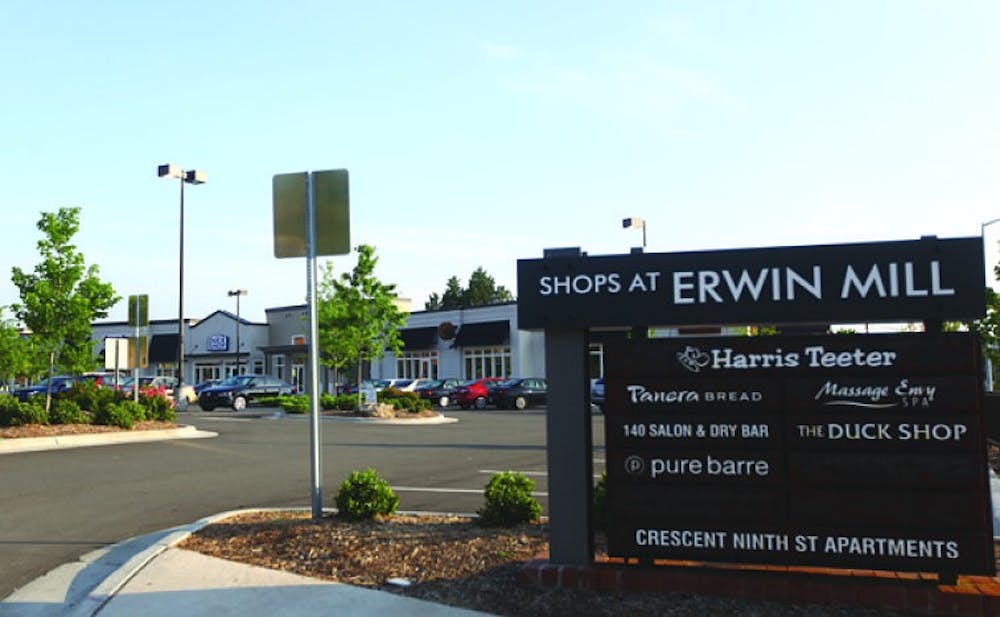Ninth Street, known by locals and students alike as the “college town” area of Durham, has seen its fair share of change over the past several decades as local businesses move in and out—in the past few years, however, a different kind of change has been taking place.
The past two years alone have seen the construction of a complex containing 303 new apartment units slated for completion in Fall 2014, a brand-new Hilton Garden Inn, a drive-through bank and a new shopping center that includes the popular 53,000 square-foot Harris Teeter supermarket. With the influx of residences and amenities, Ninth Street continues to put itself on the line between a community haven and a more developed tourist destination.
“Ninth Street has done a pretty good job at retaining its character,” said Shelly Green, president and CEO of the Durham Convention and Visitors Bureau. “It’s still a destination that people want to go to.”
Green noted that some people have expressed worry that the new stores, including chains like Harris Teeter and Panera Bread, would take away from the homegrown atmosphere of the street. However, most locally owned businesses on Ninth have stayed put so far—the notable exceptions being Charlie’s Pub & Grille, which will close later this year after facing rent hikes, and old-fashioned soda shop Ox and Rabbit, which closed in May. Green pointed out the necessity of some new amenities that have been brought in recently.
“You don’t want to destroy it by getting rid of the older places,” she said, “[But] the people who live there in those apartments, they need a grocery store, otherwise they’re going to leave that area.”
With new stores and dining, the street has also seen additions to parking, as well as a $1 per hour rate in a popular lot where it was previously free.
Tom Campbell, co-owner of The Regulator Bookshop on Ninth Street, expressed concern that rent could also increase with chain restaurants popping up across the street, even though it has remained steady so far.
“Some of the local businesses might not be able to afford that,” Campbell said.
Green said although the area has maintained the delicate balance of history and growth, it has also been at the forefront of development when compared to similar areas in Durham or across the country—progress that elsewhere might be considered unusual.
“I don’t know that you’d find that level of redevelopment nationally because we have been coming out of a recession,” Green said. “Some people are thrilled that some of these new developments are coming.”
Danielle Rios, owner of Ninth Street's Blue Corn Café, said people should not be surprised by the rising costs if they consider the corresponding prices in downtown Durham.
“We are in line to be in competition with the rest of the city…. Ninth Street has always been a staple, and everyone has been trained to think Ninth Street is inexpensive,” Rios said. “But it’s the same cost of food, oil, electric, staffing as the rest of Durham, so it really shouldn’t be any cheaper to come [here]. There are some small business that would fold but I think they would fold anyway.”
Rios said the consequences of development on Ninth Street are “nothing but positive,” with landlords refurbishing their buildings and people adapting to the flourishing atmosphere. She noted that the recent revival of downtown Durham—which happened mostly after Ninth Street had already been established as a commercial district comparable to Franklin Street in Chapel Hill—has raised the bar for Ninth Street to compete in a different type of market than it had been used to.
“Change is inevitable,” she said. “Do you feel like Ninth Street should remain the same? Why shouldn’t it grow with [Durham] and improve?”
Because most of the street is locally owned, its business tenants stand to lose more by not competing with the rest of the city, Rios said. As long as the corporate aspect of the new buildings and businesses are contained, she thinks it should benefit the area by bringing an influx of customers who are staying at the hotel or living in the apartments.
Campbell said he has not seen significant changes in business other than a slight increase in customers who are visiting or living nearby.
“I wouldn’t want it to be anymore built up, but I don’t think there’s a danger of that. It’s about as full as it can be right now,” he said.
Green also noted that the progress is not nearly complete. Another dining venue will also be added to the Shops at Erwin Mill—Juju, an Asian tapas restaurant—across from the soon-to-be-completed Crescent Ninth Street apartments.
“We’re going to keep seeing this story unfold over the next two years or so,” Green said.
The next foreseeable project is to makeover the two-story, white brick building at the corner of Ninth Street and Markham Avenue, according to the New Visitor Developments website. The building will become a mixed-use space, with two residential units on the second floor and retail on the street level. The process is expected to start this summer.
“I’m sure the best is yet to come,” Rios said.
Get The Chronicle straight to your inbox
Signup for our weekly newsletter. Cancel at any time.

